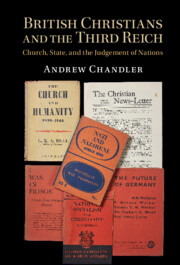Book contents
- British Christians and the Third Reich
- British Christians and the Third Reich
- Copyright page
- Dedication
- Contents
- Acknowledgements
- Introduction
- Part I An Inhabited Landscape
- Part II The German National Revolution, 1933–1934
- Part III Resisting a Rapprochement, 1935–1937
- 6 Uneasy Calm
- 7 A Dubious Stability
- 8 A Papal Encyclical, a World Conference and an Arrest
- Part IV Crisis, 1938–1939
- Part V The Onslaught, 1939–1943
- Part VI A Gathering Judgement, 1944–1949
- Endings and Legacies
- Bibliography
- Index
8 - A Papal Encyclical, a World Conference and an Arrest
from Part III - Resisting a Rapprochement, 1935–1937
Published online by Cambridge University Press: 05 May 2022
- British Christians and the Third Reich
- British Christians and the Third Reich
- Copyright page
- Dedication
- Contents
- Acknowledgements
- Introduction
- Part I An Inhabited Landscape
- Part II The German National Revolution, 1933–1934
- Part III Resisting a Rapprochement, 1935–1937
- 6 Uneasy Calm
- 7 A Dubious Stability
- 8 A Papal Encyclical, a World Conference and an Arrest
- Part IV Crisis, 1938–1939
- Part V The Onslaught, 1939–1943
- Part VI A Gathering Judgement, 1944–1949
- Endings and Legacies
- Bibliography
- Index
Summary
On 15 March 1937 there appeared the first English-language edition of a regular publication documenting in fresh detail the crisis in the German Churches. This was Kulturkampf: News Bulletin of the Religious Policy of the Third Reich. The source of this was an association, for a time called the League for the Defence of Christianity but shortly to be more widely known as the Kulturkampf Association. It was based at an address in Chancery Lane in central London. This publication was translated from an original edition produced – enigmatically – in France since a first edition in February 1936, by exiled members of the German Catholic Centre Party working under the aegis of the politician Karl Spieker. The London editor was Conrad Bonacina and the treasurer a Roman Catholic named Margrieta Beer. As Richard Bonney has shown, this new bulletin was the work of a conspicuous coalition. Influential names hovered in the background: Erwin Kraft, Bishop Bell, Norman Angell and Dorothy Buxton. The venture also marked a discreet, but notable, development in ecumenism: in due course Kraft could write to Bell that the association was led by a committee which was evenly divided between Protestants and Catholics.
- Type
- Chapter
- Information
- British Christians and the Third ReichChurch, State, and the Judgement of Nations, pp. 180 - 202Publisher: Cambridge University PressPrint publication year: 2022

